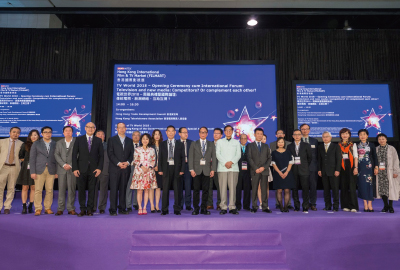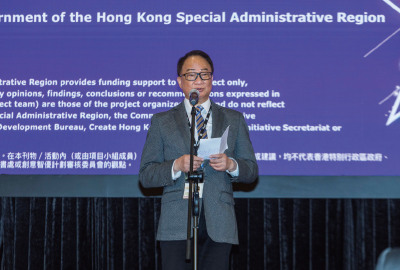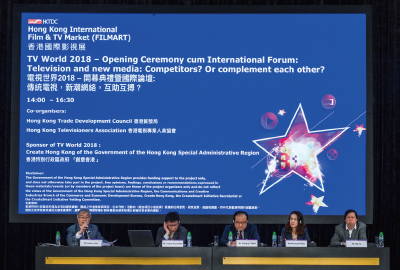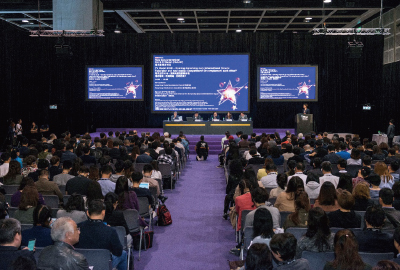|
20 March, 2018
TV World 2018 International Forum:
Television and new media: Competitors? Or complement each other?
The 22nd Hong Kong International Film and Television Market (FILMART) held an international forum at the Hong Kong Convention & Exhibition Centre on March 20.

Mr. Kit Szeto, Director & CEO of Dim Sum TV (fifth from the left) and officiating guests at the opening ceremony
In the opening ceremony, Mr. Tsui Siu Ming, Chairman of the HKTVA, stated that internet media has made an unprecedented impact on the traditional TV market. He pointed out that high-quality content with valuable information would catch audience’s attention on both digital and traditional media platforms.

Mr. Tsui Siu Ming, Chairman of the HKTVA delivering a speech
The thematic seminar entitled "Television and new media: Competitors? Or complement each other?” was held after the opening ceremony. Speakers from China, Japan, Korea and Hong Kong analyzed the challenges facing traditional TV and what TV companies have to do to adapt to the digital world.

From left to right: Mr. Peter Lam, Vice-President of the HKTVA, Mr. Yasuo Furuhata, Deputy Editor of Global Information Desk, Kyodo News, Mr. Jeon Yong Ju, President & CEO of D'Live from Korea, Ms. Michelle Mou, CEO of New Studios Picture, Mr. Ng Yu, Chief Executive Officer of Asia Television Digital Media Limited
Yasuo Furuhata, Deputy Editor of Global Information Desk, Kyodo News, provided Japanese statistics to explain the major changes in Japanese viewing habits. He stated that internet usage continues to grow in Japan, and 10 to 20 year olds spend 150 minutes a day on small-screen mobiles. And like everywhere else, social media usage in Japan has risen steeply in recent years.
Jeon Yong Ju, President & CEO of D’Live from Korea, focused on the reasons for the major shift from TV to smartphones. He predicted that in the long run, most Koreans would use smartphones for TV viewing. He anticipated that all TV companies would have to cross over to new media and predicted that more companies would seek global alliances to compete.
Michelle Mou, CEO of New Studios Picture, explained that shifting from TV to internet was not just a matter of putting TV content online. The operation mode, viewer habits and behavior are different. She shared that data gathering technology allows her company to determine precise viewer behavior, including time spent viewing, fast-forwarding, time and content preferences. Online viewing also allows viewer feedback in the comment section, making it an interactive experience and providing valuable data for content providers.
Ng Yu, Chief Executive Officer of Asia Television Digital Media Limited, pointed out that traditional TV faced a number of restrictions, such as time and space, and its one-way form of communication. However, collaboration between traditional media and internet platform could bring positive opportunities to each other. He concluded that rich content and skilled creative manpower were the keys to success.

Speakers sharing their views with the audience
|

